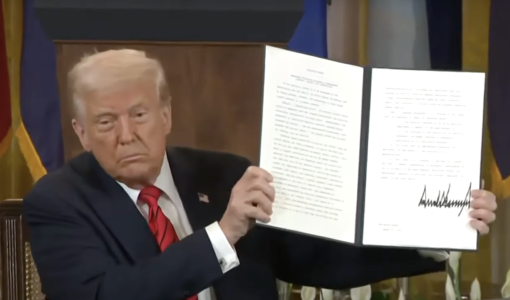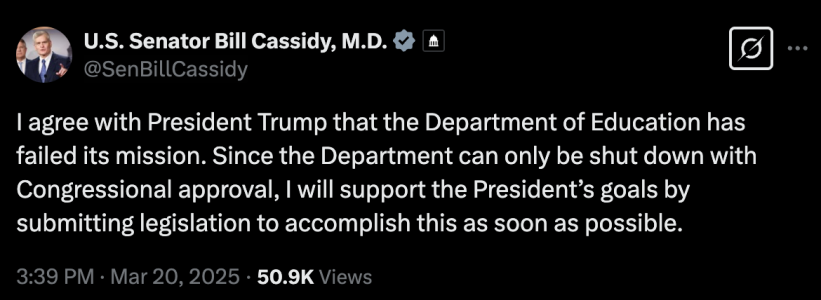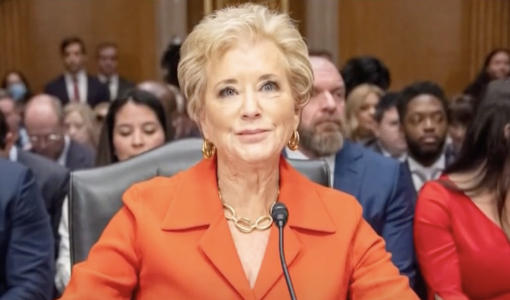Trump’s big shake-up: What it means for your grandkids’ future
By
Veronica E.
- Replies 10
Education is the foundation of a bright future, shaping not just young minds but the entire direction of our society.
That’s why any major change to the system sparks intense discussions—and President Trump’s latest move is no exception.
With the stroke of a pen, he has set in motion an effort to dismantle the Department of Education, leaving many wondering: What happens next? How will this affect our children and grandchildren? And what does it mean for the future of learning in America?
Let’s break down what this could mean for families across the country and why this decision is drawing strong reactions from all sides.

President Trump, surrounded by schoolchildren, signed an executive order expressing his intention to restructure the Department of Education.
Speaking at a ceremony in the East Room of the White House, with children seated at school desks around him, Trump remarked, "It sounds strange, doesn’t it? Department of Education. We’re going to eliminate it."
Just before signing the order, he turned to the children and asked, "Should I do this?"
His vision was clear: shift control over education from the federal government back to the states.
During the announcement, he introduced Linda McMahon, hinting that she may be the department’s last secretary.
Trump also expressed hope that congressional Democrats would support the decision, stating, "I hope they’re going to be voting for it, because ultimately it may come before them."
While this executive order signals a significant shift, it’s far from a done deal.
The Department of Education, established in 1979 under President Jimmy Carter, has been a cornerstone of federal policy for decades.
To fully abolish it, Congress must pass legislation—a challenging feat given the divided political landscape.
With 60 votes needed in the Senate, overcoming opposition will be no easy task.
Not surprisingly, Trump’s decision has been met with both praise and criticism.
Supporters argue that education decisions should be left to individual states, allowing for more flexibility and innovation.
However, opponents worry about the potential impact on disadvantaged students, special education programs, and federal student aid.
Shortly after the signing, Sen. Bill Cassidy, R-La., said on social media he would "submit legislation" to quickly advance Trump's plan to shut down the Department of Education.
Rep. Bobby Scott, D-Va., the top House Education Committee Democrat, called the order “reckless,” warning it would harm disadvantaged students.
Justifying the department's elimination, McMahon argued that it doesn’t educate students, hire teachers, set curricula, or appoint school officials. Instead, she said, it primarily provides funding, while innovation and decision-making should come from the states.

In response to growing concerns, White House press secretary Karoline Leavitt assured the public that “critical functions” such as civil rights enforcement and student loan programs would continue.
However, many questions remain about how these services will be maintained under a downsized department.
Public opinion reflects a divided nation.
A recent Quinnipiac poll found that 60% of registered voters oppose eliminating the Department of Education, while only 33% support the move.
Only 1% of Democrats support the decision, while 98% are against it.
While the administration insists this change will empower states and foster innovation, many educators, lawmakers, and advocacy groups remain skeptical.
Labor and civil rights groups condemned the decision, arguing it would lead to larger class sizes, cuts to job training and special education programs, higher college costs, and weakened student civil rights protections.
The National Association for the Advancement of Colored People (NAACP) President Derrick Johnson condemned the order as "unconstitutional," stating, "the rule of law doesn’t seem to matter" to Trump.
As the debate over the future of the Department of Education unfolds, its impact on students, teachers, and communities remains uncertain.
With strong opinions on both sides, the coming months will be crucial in determining the role of federal oversight in education.

What do you think about this proposed change? How do you see it impacting schools, students, and communities across the country? Share your thoughts in the comments below!
That’s why any major change to the system sparks intense discussions—and President Trump’s latest move is no exception.
With the stroke of a pen, he has set in motion an effort to dismantle the Department of Education, leaving many wondering: What happens next? How will this affect our children and grandchildren? And what does it mean for the future of learning in America?
Let’s break down what this could mean for families across the country and why this decision is drawing strong reactions from all sides.

President Trump signs an executive order aimed at dismantling the Department of Education, sparking nationwide conversation. Image Source: YouTube / CBS News.
A Historic Announcement That Shook the Education System
President Trump, surrounded by schoolchildren, signed an executive order expressing his intention to restructure the Department of Education.
Speaking at a ceremony in the East Room of the White House, with children seated at school desks around him, Trump remarked, "It sounds strange, doesn’t it? Department of Education. We’re going to eliminate it."
Just before signing the order, he turned to the children and asked, "Should I do this?"
His vision was clear: shift control over education from the federal government back to the states.
During the announcement, he introduced Linda McMahon, hinting that she may be the department’s last secretary.
Trump also expressed hope that congressional Democrats would support the decision, stating, "I hope they’re going to be voting for it, because ultimately it may come before them."
Also read: Is the Education Department changing? What Trump’s possible executive move could mean
The Roadblocks Ahead
While this executive order signals a significant shift, it’s far from a done deal.
The Department of Education, established in 1979 under President Jimmy Carter, has been a cornerstone of federal policy for decades.
To fully abolish it, Congress must pass legislation—a challenging feat given the divided political landscape.
With 60 votes needed in the Senate, overcoming opposition will be no easy task.
Also read: Breaking: Trump’s latest move could reshape an essential institution—here’s what you need to know
Mixed Reactions and Growing Concerns
Not surprisingly, Trump’s decision has been met with both praise and criticism.
Supporters argue that education decisions should be left to individual states, allowing for more flexibility and innovation.
However, opponents worry about the potential impact on disadvantaged students, special education programs, and federal student aid.
Shortly after the signing, Sen. Bill Cassidy, R-La., said on social media he would "submit legislation" to quickly advance Trump's plan to shut down the Department of Education.
Rep. Bobby Scott, D-Va., the top House Education Committee Democrat, called the order “reckless,” warning it would harm disadvantaged students.
Justifying the department's elimination, McMahon argued that it doesn’t educate students, hire teachers, set curricula, or appoint school officials. Instead, she said, it primarily provides funding, while innovation and decision-making should come from the states.

Sen. Bill Cassidy announces plans to introduce legislation to shut down the Department of Education. Image Source: X / @SenBillCassidy.
In response to growing concerns, White House press secretary Karoline Leavitt assured the public that “critical functions” such as civil rights enforcement and student loan programs would continue.
However, many questions remain about how these services will be maintained under a downsized department.
What Do the Polls Say?
Public opinion reflects a divided nation.
A recent Quinnipiac poll found that 60% of registered voters oppose eliminating the Department of Education, while only 33% support the move.
Only 1% of Democrats support the decision, while 98% are against it.
The Future of Education: A New Beginning or a Step Back?
While the administration insists this change will empower states and foster innovation, many educators, lawmakers, and advocacy groups remain skeptical.
Labor and civil rights groups condemned the decision, arguing it would lead to larger class sizes, cuts to job training and special education programs, higher college costs, and weakened student civil rights protections.
The National Association for the Advancement of Colored People (NAACP) President Derrick Johnson condemned the order as "unconstitutional," stating, "the rule of law doesn’t seem to matter" to Trump.
As the debate over the future of the Department of Education unfolds, its impact on students, teachers, and communities remains uncertain.
With strong opinions on both sides, the coming months will be crucial in determining the role of federal oversight in education.
Key Takeaways
- President Trump has signed an executive order in an attempt to dismantle the Department of Education, claiming its elimination is necessary.
- Congressional approval is required to fully abolish the department, and major obstacles from Democrats are anticipated.
- The executive order states that "critical functions" of the department, such as the enforcement of civil rights laws and oversight of student loans and Pell Grants, will continue.
- The move to dismantle the Department of Education is generally unpopular, with polling indicating significant opposition, particularly among Democrats and independents.
What do you think about this proposed change? How do you see it impacting schools, students, and communities across the country? Share your thoughts in the comments below!







